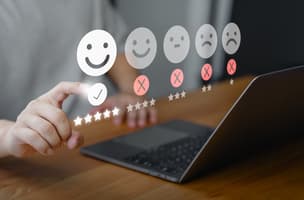How to future-proof your customer service operation
The world is changing at an increasingly fast pace. To understand the impact on customer service, Whistl has outlined 10 of the latest consumer trends, predictions, and customer service facts influencing businesses’ customer support operations. These insights will help you to learn how to turn your customer service offering into a competitive differentiator and profit centre.
1. AI and customer service chatbots for scalability and workforce efficiency
More often customers demand empathy from the businesses that they deal with while relying on a wide variety of communication channels. This demand can put a lot of pressure on businesses to offer meaningful and helpful customer support solutions on such a large scale. One way to remedy this is to utilise artificial intelligence and machine learning to solve problems that have an easy-to-predict solution. Automated customer service for the majority, allows the human workforce to focus on more complex tasks such as queries that really need a human touch.
With 30% of businesses planning to increase investment in AI by 50% over the next three years, Artificial Intelligence (AI) is on the rise. Furthermore, a study by our subsidiary company Parcelhub found 32% of mid-market retailers plan to invest in AI to support the customer journey.
2. Self-serve is an increasingly popular consumer trend
Human interaction is not always a necessity and can often detract from the customer experience. At Whistl we found over half of consumers prefer to shop with retailers who offer self-checkouts in a retail environment. Whistl also found consumers only want human interaction if they couldn't find what they're looking for or if they have a problem with an existing purchase.
81% of all customers attempt to take care of matters themselves before reaching out to a live representative, so creating a self-service area of your website will help customers find what they need more quickly.
However, after attempting to help themselves, many consumers still end up having to call the company; more than 50% would prefer to pick up the phone to contact companies in the Healthcare; Public; Utilities; Telecom/Mobile sectors. Customers wanting to get in touch with the Charity or Retail sectors were more likely to use a diverse range of contact methods.
Within e-commerce, more than 50% of online buyers abandon their shopping cart if they can’t find a quick answer to a question they have about their intended purchase. Therefore, the more you can help your prospects and customers help themselves, the more they are likely to be satisfied, placing less strain on your own or outsourced customer service team.
3. Outsourcing call handling can increase customer loyalty
Whistl’s latest UK consumer research study shows that 46% of consumers said they stopped using a company/organisation based on a poor call centre experience. Whistl’s subsidiary company Parcelhub surveyed in 2019 of retailers’ attitudes towards delivery and customer service innovation. Parcelhub found that 24% of retailers plan to invest in outsourcing customer service operations as a way to make customer service their competitive advantage.
Business process outsourcing is on the rise, with a 10% growth in 2019, which means retailers must consider third party support as a viable alternative to managing customer service in-house.
4. Consumers expect an omnichannel customer experience
Omnichannel customer service is the ultimate goal for many multi-channel businesses. Having an omnichannel customer service offering gives the ability to offer a seamless experience to customers and consumers regardless of their communication channel preference.
According to Statista, 47% of US consumers have a more favourable view of brands who respond to customer service questions or complaints on social media. However, while social media usage is on the rise, consumers still much opt to use the phone as their preferred channel.
In a recent Whistl study on what consumers want from call centres, we found that customers who wish to make a complaint or report a problem wish to do so by phone but are less likely to opt for using social media, writing a letter, sending a text or using a mobile app.

While consumers prefer to use the phone when making a complaint, booking an appointment and general enquiries, only 15% are most likely to use the phone when placing an order. Surprisingly, only 1.3% of consumers prefer to use social media when making a complaint, preferring to utilise channels within the companies’ digital real estates such as web chat (4%) and apps (2.5%).
Consumers’ channel preferences shift depending on which industry their service provider is in, with as many as 59% of consumers preferring phones when dealing with the Healthcare sector, but as few as 26% when dealing with the charity and fundraising sector.
5. Helpdesk software can harmonise channel communications on the consumers’ terms
Gartner predicts that by 2022 phone conversations with customer service reps will make up merely 12% of service interactions. Because consumers are becoming increasingly comfortable across a wider variety of channels, online retailers require more than just a friendly helpdesk to assist potential and existing customers. This places the importance on the retailers and the public sector to take advantage of helpdesk software such as Freshdesk.
Helpdesk software such as Freshdesk can empower customer service departments, giving full control and visibility over customer queries, regardless of channel.
In 2019, Parcelhub found that 29% of mid-market retailers plan to invest in customer experience management platforms in response to these changes.
6. Face-to-face communications will mean better customer engagement
Despite the rising popularity of new and more unconventional customer service channels, consumers still like to speak to a human being. However, UK consumer confidence in modern customer service centres is incredibly low with a whopping 90% describing them as ‘ineffective at dealing with issues’. Because of this emerging expectation gap, businesses need to embrace new technology in a way that they can still deliver the human touch.
7. Remote working can produce better results
Before the Covid-19 pandemic became disruptive on a global scale, it was already widely known that employees working from home make them more productive. For example, Airtasker recently conducted a study of 505 remote working employees and found remote employees have 8.5 hours of extra free time per week and are saving over £3600* annually on commuting. *(converted from USD)
8. Personalisation will help businesses better entertain and engage customers
Personalised customer experiences can lead to revenue increases of 10%, and 20% increases in marketing spend efficiency.
In the future, industries as diverse as telecoms, healthcare and retail are investing in inter-business ecosystems to improve their customer service and Customer Data Platforms to better understand their best customers. Furthermore, businesses plan to utilise personalised interactive videos to give customers the chance to self-serve in an interactive way.
9. Businesses are prioritising investment in customer service
90% of 220 UK and US companies in a recent study commissioned by the UK-based Institute of Customer Service (ICS) saw customer service as crucial to their future business success. They're recognising that in a competitive business environment where it can cost 10 times more to acquire a customer than to keep one, it pays handsome profits to pay close attention to customer service.
There is plenty of data to support that investing in enhancing your customer experience delivers strong ROI, and is crucial to maximising customer lifetime value. Bain & Company argues companies have no choice but to invest in customer service and that organisations are now recognising that all staff who have frequent contact with the customer need continuous upskilling. Moreover, our subsidiary company Parcelhub found 39% of retailers plan to expand their internal customer service operations.
10. Customer service will become more predictive and less reactive
In the future customer service departments will evolve to become more proactive to place the customer right at the centre of attention. By carefully mapping out events, and sequences of events in the customer journey, businesses can predict the incidence of customer service degradation. Therefore identifying gaps in service quality and preventing customer queries and complaints from happening in the first place.
Planning for the future of customer service
When reviewing the potential future of customer services, the best approach a business can take is to build in the right contingencies for your business’s industry sector and the number of customer contacts received each day. One way to do this is to increase capacity with customer service resources, enabling your business to maintain service levels, even when there are spikes in demand.
Self-service options are here to stay, and by helping your customers help themselves, on their terms, this can minimise the impact of negative experiences and make your business stronger with more loyal customers, if deployed effectively.
Businesses looking to keep customer service support in-house may need to invest time and resources to continually research what their customers need. This may include preference in contact channels and reviewing current call or complaint handling techniques. The additional budget may also be required to research and deploy the right technologies and interactions your customers expect from your business or industry sector, to future-proof your customer service approach.
With the right outsourced customer service partner, you will benefit from wider industry knowledge and trends, to innovate within all the channels you provide customer service through. At Whistl, we help businesses in a broad range of sectors with outsourced contact centre services. All of our services are tailored to your needs and with a wide range of solutions, we are well suited to give effective customer service with our outsourced contact centre.
Join our mailing list
Sign up and receive all the latest industry news and insights directly to your inbox.
Research, Insights and Industry Guides
In depth insights and research studies to help you better understand customer perceptions & expectations.
Share this article



